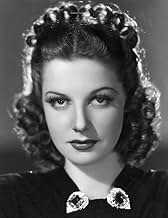From a "letter of introduction" aging actor John learns that he has a grown daughter, aspiring actress Katherine. They keep their secret, but he agrees to star with her in a play to further ... Read allFrom a "letter of introduction" aging actor John learns that he has a grown daughter, aspiring actress Katherine. They keep their secret, but he agrees to star with her in a play to further her career on Broadway.From a "letter of introduction" aging actor John learns that he has a grown daughter, aspiring actress Katherine. They keep their secret, but he agrees to star with her in a play to further her career on Broadway.
- Awards
- 5 wins total
- Reporter
- (uncredited)
- Reporter
- (uncredited)
- Disbelieving Man at Barry's Party
- (uncredited)
- Man at Barry's Party
- (uncredited)
- Minor Role
- (uncredited)
- Mrs. Meggs - the Landlady
- (uncredited)
- Minor Role
- (uncredited)
- Reporter
- (uncredited)
Featured reviews
Adolph Menjou is a John Barrymore type actor, once a great stage actor, but who lately has been doing a lot of mediocre films has returned to New York with an unknown future. Andrea Leeds has a Letter Of Introduction from her mother for him and Menjou discovers that despite being married our times and about to go for number five it's with the author of the letter with whom he has a daughter.
Who wants to be an actress. The rather arrogant Menjou discovers a tender side when he discovers fatherhood. His scenes with Leeds have some real poignancy to them. Menjou who could ham it up outrageously when called for is most subdued and effective here. The two keep the relationship a secret and it's rumored that Menjou snagged himself some new young quail. All rather disconcerting to George Murphy who Leeds has been seeing.
Both Murphy and Leeds live in a boardinghouse not unlike the one in Stage Door. Among the other residents are Eve Arden in an Eve Arden type part, Ann Sheridan, and Edgar Bergen&Charlie McCarthy&Mortimer Snerd. Bergen and his wooden alter egos supply the comedy.
No doubt John and Diana Barrymore saw Letter Of Introduction. Wonder what they thought? No matter what they thought the film is a good one.
The daughter wants his help in starting her career on stage, and he has to struggle to do it, without divulging the relationship, lest the Casanova's real age is known to public. Without the clarifications, gossip magazines have a field day, destroying the romances of both father and daughter.
This has too interesting to be a mere coincidence similarity with the great but equally tragic (alcohol curse) actor John Barrymore - of the revered Barrymore family (here the name is changed to Mannering family), and the daughter Diana (here Kay martin) is from first wife, instead of real-life second wife. This movie (1938) precedes what happened in real life - and the difference isn't too far. Diana, also beset with tragedy as her father, was estranged from John, and landed up in Broadway one year later, in 1939. John was married four times, here Mannering's just missed the fourth. The fourth wife, Elaine was 21, and he was 54 (in this movie, it was 22 and 52, not too far away). Even the last stage appearance of John has remarkable similarity with this - only that happened four years after this movie was released. One of the comments here talks of what Diana and John thought about it - it should be in fact other way - they didn't learn from it - and in fact followed what was depicted here.
****** Letter of Introduction (8/5/38) John M. Stahl ~ Adolphe Menjou, Andrea Leeds, Edgar Bergen, George Murphy
Adolphe Menjou and Andrea Leeds are both well cast in the leading roles, as a father and daughter who try to keep their relationship hidden as they work together on the stage. Menjou is always enjoyable to watch in this kind of role, as something of a scamp who nevertheless has a caring heart. Leeds makes good use of her innocence and earnestness. As the central relationship in the story, their two characters also make a nice change of pace from the more conventional setups in comedies of this kind.
The supporting cast likewise features plenty of talent. In particular, Edgar Bergen and Charlie get some of the best lines, Eve Arden is well-suited to her role, and Ernest Cossart seems right at home as Menjou's butler.
Everything fits together well, and in addition to providing some entertaining moments, it includes the kind of drama that makes you think along with the characters and ask yourself what you might do in the same situation.
Did you know
- TriviaThe film dialogue often refers to "The Lambs Club," which is still around! The Lambs was formed in 1874 and is a club for actors and entertainment professionals.
- Quotes
Edgar Bergen: I don't think that's very funny.
Charlie McCarthy: You don't?
Edgar Bergen: No.
Charlie McCarthy: Well then, why did you make me say it?
Edgar Bergen: Oh, I see.
Charlie McCarthy: [Aside] That kills him, yes.
[to Bergen]
Charlie McCarthy: Uh, you're not so clever either, Mr. Bergen.
Edgar Bergen: Oh, I'm not?
Charlie McCarthy: No, I can see your lips move.
Edgar Bergen: Oh, you can?
Charlie McCarthy: [Aside] That burns him up, you know. I'll hear about this when I get home.
Edgar Bergen: Yes, you will.
[pause]
Edgar Bergen: Well, I'm sorry about that.
Charlie McCarthy: Will you watch it, please?
Edgar Bergen: I will watch it, yes.
Charlie McCarthy: Yes, it spoils the illusion. After all, there's no use of both of us being dummies.
- ConnectionsEdited into Your Afternoon Movie: Letter of Introduction (2022)
Details
- Runtime
- 1h 44m(104 min)
- Color
- Aspect ratio
- 1.37 : 1









































